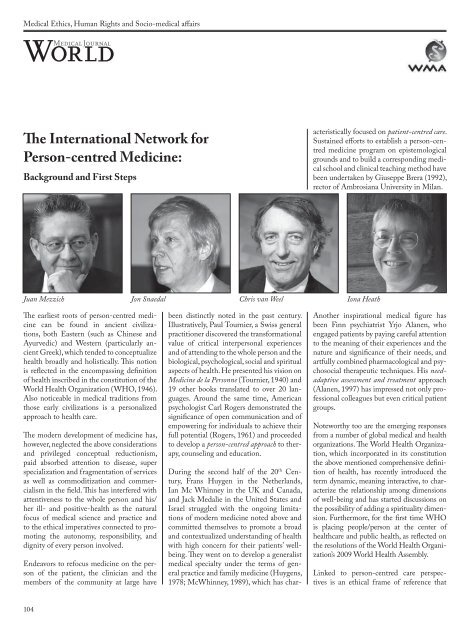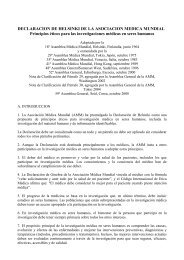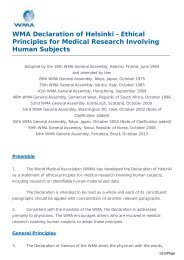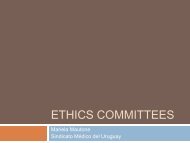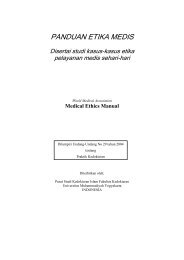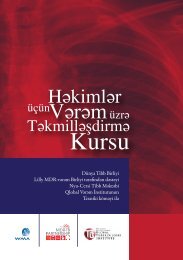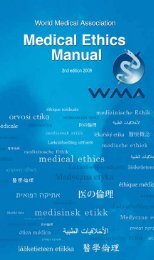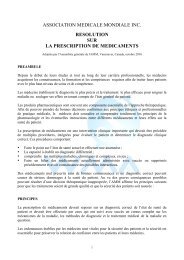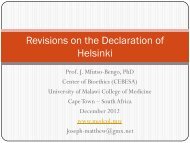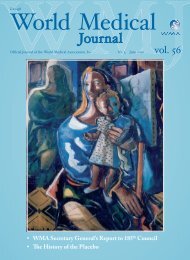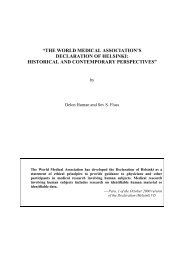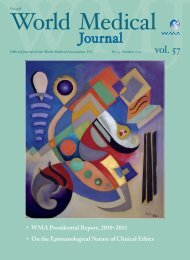wma 7-2.indd - World Medical Association
wma 7-2.indd - World Medical Association
wma 7-2.indd - World Medical Association
Create successful ePaper yourself
Turn your PDF publications into a flip-book with our unique Google optimized e-Paper software.
<strong>Medical</strong> Ethics, Human Rights and Socio-medical affairs<br />
The International Network for<br />
Person-centred Medicine:<br />
Background and First Steps<br />
During the second half of the 20 th Century,<br />
Frans Huygen in the Netherlands,<br />
Ian Mc Whinney in the UK and Canada,<br />
and Jack Medalie in the United States and<br />
Israel struggled with the ongoing limitations<br />
of modern medicine noted above and<br />
committed themselves to promote a broad<br />
and contextualized understanding of health<br />
with high concern for their patients’ wellbeing.<br />
They went on to develop a generalist<br />
medical specialty under the terms of general<br />
practice and family medicine (Huygens,<br />
1978; McWhinney, 1989), which has characteristically<br />
focused on patient-centred care.<br />
Sustained efforts to establish a person-centred<br />
medicine program on epistemological<br />
grounds and to build a corresponding medical<br />
school and clinical teaching method have<br />
been undertaken by Giuseppe Brera (1992),<br />
rector of Ambrosiana University in Milan.<br />
Juan Mezzich Jon Snaedal Chris van Weel<br />
Iona Heath<br />
The earliest roots of person-centred medicine<br />
can be found in ancient civilizations,<br />
both Eastern (such as Chinese and<br />
Ayurvedic) and Western (particularly ancient<br />
Greek), which tended to conceptualize<br />
health broadly and holistically. This notion<br />
is reflected in the encompassing definition<br />
of health inscribed in the constitution of the<br />
<strong>World</strong> Health Organization (WHO, 1946).<br />
Also noticeable in medical traditions from<br />
those early civilizations is a personalized<br />
approach to health care.<br />
The modern development of medicine has,<br />
however, neglected the above considerations<br />
and privileged conceptual reductionism,<br />
paid absorbed attention to disease, super<br />
specialization and fragmentation of services<br />
as well as commoditization and commercialism<br />
in the field. This has interfered with<br />
attentiveness to the whole person and his/<br />
her ill- and positive-health as the natural<br />
focus of medical science and practice and<br />
to the ethical imperatives connected to promoting<br />
the autonomy, responsibility, and<br />
dignity of every person involved.<br />
Endeavors to refocus medicine on the person<br />
of the patient, the clinician and the<br />
members of the community at large have<br />
been distinctly noted in the past century.<br />
Illustratively, Paul Tournier, a Swiss general<br />
practitioner discovered the transformational<br />
value of critical interpersonal experiences<br />
and of attending to the whole person and the<br />
biological, psychological, social and spiritual<br />
aspects of health. He presented his vision on<br />
Medicine de la Personne (Tournier, 1940) and<br />
19 other books translated to over 20 languages.<br />
Around the same time, American<br />
psychologist Carl Rogers demonstrated the<br />
significance of open communication and of<br />
empowering for individuals to achieve their<br />
full potential (Rogers, 1961) and proceeded<br />
to develop a person-centred approach to therapy,<br />
counseling and education.<br />
Another inspirational medical figure has<br />
been Finn psychiatrist Yrjo Alanen, who<br />
engaged patients by paying careful attention<br />
to the meaning of their experiences and the<br />
nature and significance of their needs, and<br />
artfully combined pharmacological and psychosocial<br />
therapeutic techniques. His needadaptive<br />
assessment and treatment approach<br />
(Alanen, 1997) has impressed not only professional<br />
colleagues but even critical patient<br />
groups.<br />
Noteworthy too are the emerging responses<br />
from a number of global medical and health<br />
organizations. The <strong>World</strong> Health Organization,<br />
which incorporated in its constitution<br />
the above mentioned comprehensive definition<br />
of health, has recently introduced the<br />
term dynamic, meaning interactive, to characterize<br />
the relationship among dimensions<br />
of well-being and has started discussions on<br />
the possibility of adding a spirituality dimension.<br />
Furthermore, for the first time WHO<br />
is placing people/person at the center of<br />
healthcare and public health, as reflected on<br />
the resolutions of the <strong>World</strong> Health Organization’s<br />
2009 <strong>World</strong> Health Assembly.<br />
Linked to person-centred care perspectives<br />
is an ethical frame of reference that<br />
104


